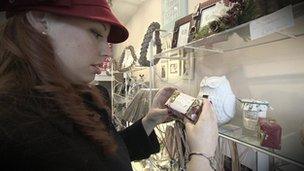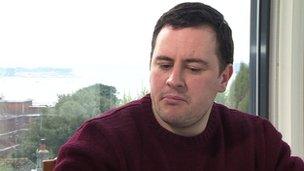How a family is managing to live on British-made goods
- Published
James Bradshaw: "There are still things we can't find"
Angered by large foreign companies' failure to pay full rates of corporation tax in the UK, the Bradshaw family are on a mission to see whether they can survive for a year buying only British-made goods. With a quarter of 2013 now gone, how has it been so far?
"The last three months have actually been really good fun, says Emily Bradshaw. "We're still quite surprised by the level of enthusiasm for what we're doing and the support we've had.
She is having a cream tea in Dorset. Emily, her husband, James, and two-year-old son Lucan, are on an Easter break from their Kent home.
"There's still a few things we can't find or that we've been limited by, but I think we're proof that it is currently bearable," says James.

The Bradshaws have found British-made toys hard to come by
Initially the Bradshaws struggled to find everyday items, like nappies, batteries and even British-made clothes. But after extensive research online and help from thousands of followers on social media James and Emily have been genuinely surprised by how much is still made in Britain.
The one thing that has really disappointed them concerns their son Lucan.
"There just isn't much of a British toy industry," says James.
"That's really sad because having a two-year-old son, you want to go to the shops and buy him something, and you're at a bit of a loss buying British toys."
Locally sourced ingredients
The Bradshaws are combining their holiday in Dorset with a visit to businesses that are still making things in the UK.
First stop is cosmetics company Lush.
They are given a tour of the plant by co-founder Helen Ambrosen.
Is it important to the business that it manufactures in the UK?
"It is very much. It means that we can buy locally sourced ingredients and we can support British suppliers," says Ms Ambrosen.
"We believe passionately in manufacturing in Britain. It is a resource that we've lost in this country and it is very possible to have very good profitable manufacturing businesses here."
Lush has seven factories in Dorset, employing 500 people. It makes 93 million cosmetic products a year and had a turnover of £368m last year.
For Ms Ambrosen, shipping production off to a cheaper foreign company was never an option.
"We need our products made close to where we retail because the ingredients are fresh. And it's important to keep a close eye on your supply chain and costs."
The Bradshaws stop for a moment to reflect.
"We've neglected manufacturing for such a long time, and it's actually just such a positive sign that there's anyone making anything left in this country," says James.
"Getting people to buy British again - that's got to be a great cause.
"We just need to raise the profile of the fantastic stuff we still produce in this country."
'Pan-British product'
During the course of their holiday, the Bradshaws are visiting 10 different UK manufacturers. We followed them to Mathmos, makers of the lava lamp.
"The bottles are made in Yorkshire, the bases are spun in Devon, the plastic bases made in the Midlands and the end assembly and filling is done here," says Mathmos owner Cressida Granger.
"It's really a pan-British product."
It's the 50th anniversary of the lava lamp this year and of Mathmos, which is proud still to be manufacturing in Dorset.
But some items in the company's range are now made in China.

The Bradshaws want to encourage manufacturers to come back to Britain
Emily wants to know why.
"Does it more than anything boil down to cost?" she asks.
It does, Ms Granger says. "The cost of tooling in Britain for the sort of products we make can be 20 times as much as in China. We wouldn't have survived if we'd made everything here."
And there's the rub.
British manufacturing has been in long-term decline for decades. Even though the cost of producing goods in developing countries is on the rise, it is still, in most cases, far cheaper to make things abroad.
None the less the Bradshaws leave uplifted. They have been impressed by the level of service, value and enthusiasm they have found in people who still make things in Britain.
"I think we have become very disposable as a nation," says Emily.
"If we can come back to manufacturing things here and we put more value on to what it is that has been manufactured, then there is a message there - that it's not just how much it costs to make but what it's actually worth."
It may sound idealistic, but this is the start of the Bradshaws' plan to get more people to follow their lead and buy British.
- Published15 January 2013
- Published3 October 2012
- Published8 November 2011